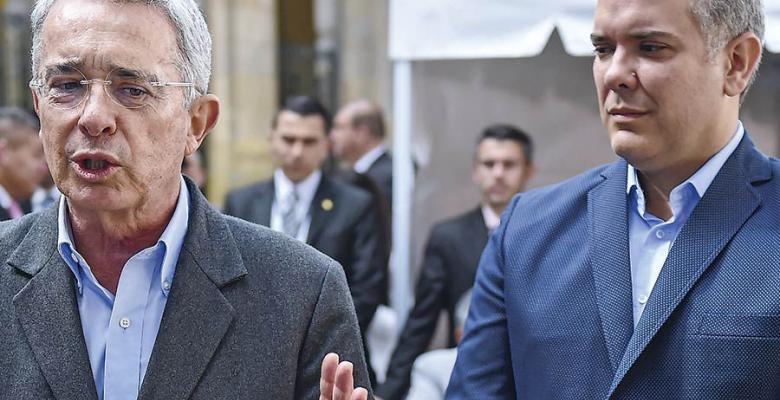Colombia: President Looking North
especiales

Iván Duque has been shortly in the presidency of Colombia and many already consider him to be at the top among the leaders of the South American nation who have outrivaled in bad politics towards his people and the very common commitment to U.S. imperialism.
They say that comparisons are unhealthy, but really, most Colombian presidents surpass his colleagues in other parts of the continent in faithfully following Washington's orders; the Empire, on the other hand, lets them do what they want in domestic affairs that reach shamelessness.
Undoubtedly, Duque won the presidential elections, regardless of whether actions that revealed fraud in his favor in some departments were exposed, although not as much as those carried out by his mentor, guide and teacher Álvaro Uribe, who constantly used national security on the Atlantic Coast, particularly in Magdalena and Córdoba, to achieve a number of votes in places that clearly exceeded the number of inhabitants.
But we are speaking of Duque, who by the way ignores demands of international organizations so that he doesn’t ignore the peace agreement signed by the previous government with the Revolutionary Armed Forces of Colombia – which became a political party -, he uses the army to organize and train paramilitary groups that carry the “dirty work” of assassinating hundreds of social leaders and ex-combatants who laid down their arms, and he has given the go-ahead to the increase in drug trafficking groups and military aerial bombing that destroy illicit fields of peasants who had been promised official help so that they would not continue planting.
It’s known the official participation with the counterrevolutionary forces that have been carrying out penetration raids in Venezuela, his support to mercenary elements that failed in the recent and unsuccessful incursion on the coasts of the neighboring country and the submissive connection to the North American troops stationed in Colombian territory, under the fake reason of fighting drug trafficking and using it in preparation for a future attack on the Bolivarian Revolution.
Duque does not hold his tongue to threaten military intervention in the neighboring country, and on the same path he had announced the withdrawal of Colombia from UNASUR. Truth be told the constitution of this process of regional integration was never welcomed by the Colombian extreme right sectors who, taking advantage of the regional context, ratify their obedience to the U.S. Pan-American doctrine. Colombia's departure from that body is a self-fulfilling prophecy of right-wing looking north to make national decisions.
ISSUES
Colombia's attachment to the U.S. foreign policy in terms of security, diplomacy, and economic model puts it in some trouble, especially due to the growing crisis in global geopolitics generated by the Trump trade war against China, since that country already responds to Washington proportionately to the damage caused by tariffs on its products. This reply affects the external sector of Colombian politics, which has been looking at China as a recipient of exports, given the failure of the Free Trade Agreement with the United States.
On the other hand, the distance from a close look at Latin America deepens the crisis in relations with Venezuela, which, in addition to trying to antagonize sister peoples, restrains the possibility of generating jobs and industrial projects on Colombian soil. Venezuela was its second commercial partner, with exports of value-added goods, shoes, clothing, food, cars, which after disappearing, made a negative impact on the Colombian industry and on the creation of jobs.
But the most significant feature of Duque's disastrous policy towards his people is the more than 10,000 deaths the COVID-19 epidemic has already claimed, as a consequence of the failure to fulfill promises related to change in the health system, a failure also seen in the non-expansion of the educational budget, the modification of the pension system and the development of the Integral Rural Reform derived from the Peace Treaties.
In addition, the choosing of a technocratic cabinet and strict defender of neoliberalism assumes that these issues were addressed from the perspective that these demands are services and not the rights of citizens, therefore worsening the current conditions of the social security system and education, even more so for rural communities.
Thus, Iván Duque is consistent with his support for the Colombian extreme right and, together with it, I repeat, he looks to the North to make national decisions.
Translated by Amilkal Labañino / CubaSí Translation Staff













Add new comment